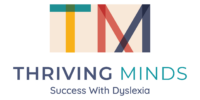Services
How Can We Help?
Thriving Minds SD is a strength-based approach that harnesses the mental talents that dyslexic people share to overcome learning problems.
To do this, students must use different strategies than are commonly taught with remedial programs. When dyslexic students recognize their mental talents, they develop a renewed sense of self-esteem and confidence. When they start to apply study methods that capitalize on their talents, progress is very rapid.
Thriving Minds is owned and operated solely by Barb Rounds. When working with students, Barb utilizes a variety of methods incorporating multi-sensory components that best match the individual's learning style and needs.
All tutoring work at Thriving Minds SD is conducted one-on-one with Barb Rounds. It is guaranteed the client will not be shifted between a variety of tutors, as often occurs in other learning centers. This consistency builds a relationship of trust between the educator and the client. Building trust and addressing all areas of development creates an increased level of self-esteem in the learner. Increased confidence is the foundation for improving academic skill sets.
Barb believes learning is fun, and she wishes for her students to share that same philosophy. Guiding students to create a growth mindset is a key foundation for her students to develop in the path of being life-long learners. Using a multitude of interactive and creative teaching methods. Barb guides her students to attain academic concepts, while also guiding them to believe in themselves and to understand how they individually best learn.
Areas of Service:
Tutoring services typically in language arts
Consulting services for families navigating 504 Plan & IEP Services
Helping families navigate their way to find helpful resources is my passion
FAQ
Dyslexia is the most common cause of reading, writing, and spelling difficulties. Dyslexia affects males and females nearly equally as well as people from different ethnic and socio-economic backgrounds nearly equally.
Kids with dyslexia might need from six months to three years of tutoring to be able to read fluently.
- Listening to audiobooks as an alternative to reading.
- Typing on a computer or tablet instead of writing.
- Apps that can make learning fun by turning decoding into a game.
- Using a ruler to help kids read in a straight line, which can help keep them focused
The Rehabilitation Act of 1973 Section 504 prohibits discrimination that is based upon a disability. Section 504 requires that a child who has a legal diagnosis and is attending either an elementary or secondary school is entitled to accommodations that will ensure their success academically.
No, dyslexia is still seen by many insurers as a “developmental” or “academic” issue that should be handled by schools.
» Dyslexia (Strategies to Aid Academic Success)
» Reading Deficiencies (Decoding and Comprehension)
» Spelling Deficiencies
» Composition / Writing Deficiencies
» Dysgraphia (Penmanship Deficiencies)
